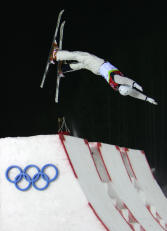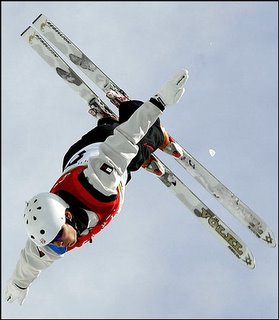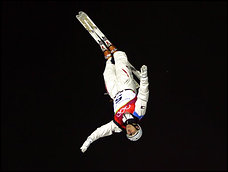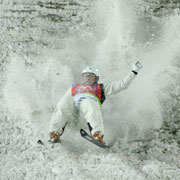The Hurricane

The Olympics breeds heroes. The right kind of heroes. The ones whose greatness is defined by more than medals and whose sheen sometimes shows signs of tarnish.
As we look back on the 2006 Winter Olympics in Torino, we find this particular hero.
We find the symbol of the competitive spirit. It emerges through muck of television's so-called "Chevy Olympic Moments" that -- for the sake of corporate brand identity --hijack and exploit the lives of men and women who give us a glimpse of their souls through the prism of the pursuit of accomplishment.
We find the fire nearly suffocated beneath the sanctimonious media information filterers who deify and demonize, depending on what pre-cooked expectations are met or not realized.
Apolo Anton Ohno. Shaun "The Flying Tomato" White. Joey Cheek. Ted Ligety.
These are but a few of the more-celebrated winners we'll remember.
As we should.
Whether we'll remember Jeret "Speedy" Peterson, though, is not so certain.
The 24-year-old Idaho native finished seventh in the standings of the freestyle skiing aerials. The aerial competition features daredevils soaring off a ramp -- sometimes five stories above the ground -- and twisting and contorting through the air like crazed-but-somehow-graceful birds in flight.
Yet, he went for it. "The Hurricane."
For the time being, it's the toughest and scariest move with the highest degree of difficulty in the sport -- a three-flip, five-twist maneuver 50 feet in the air that defies the very real possibility of snapping a neck.

When he qualified for the finals earlier in the week, he told an NBC reporter that Italy wouldn't know what storm had hit them by the time he was done. His enthusiasm was playful, idealistic, infectious.
When it came time, he went for it. He performed the The Hurricane to near-perfection, until he landed, just so, with his rear-end and right hand slightly dragging the snow. He raised his left arm to try to fool the judges, but it didn't work.
The degree of difficulty was scored high, but the landing judges negated the gains in the aerial display.
As they probably had to. If you measure success by hardware.
If he had tried a trick with a lower degree of difficulty, he very likely would have won a medal (after watching Sasha Cohen fall, the Japanese figure skater who won gold took the safer route and held back on the more-difficult moves she had planned).
That isn't what Speedy Peterson came for. He came for a hurricane, not a thunderstorm:
"That's what the Olympics are about. They're about going for it and being the best. Or trying your best and failing. They're not about holding back. I came here to do The Hurricane. I would have done it if I was 50 points behind or 50 points ahead. I never thought about not doing it. I'm disappointed, but I am trying to advance my sport, take it to a higher level. I came here to do the Hurricane in the Olympics, and I did. No regrets."
Peterson, as he tells it, was molested as a child. He lived a childhood of rebellion, self-blame and anger. He tells children similarly abused not to blame themselves. That's why he made his abuse public three years ago.
Last summer, he watched his close friend put a gun to his temple and pull the trigger. When he was 5, a drunk driver killed his sister.
His friend gave up his life. His sister lost hers. Peterson remembers their lives to help him relish in his own.
As his move would testify, he lives on the margins of potential oblivion.
He skydives and rides motorcycles at 150 mph.
Last summer, he took $5,000 he earned at Home Depot and turned it into more than $200,000 after a trip to Las Vegas.
Yesterday, a day before the closing ceremony, U.S. Olympics officals sent him home after a drunken, late-night brawl in which he punched a friend in the face and forced police to separate the two.
He is a tarnished hero.
A medal might have hidden that a bit, perhaps provided a distracting light to blind everyone to the darkness men like him fight like mad not to succumb to.
But the medal, too, would have tarnished eventually.
And all he'd be left with was the memory of what he did when he was here.
He did what he came to do.
7 comments:
that reminds me a bmx-ing friend who was doing some bizarre somersault on a concrete half-pipe.
he broke his leg, amongst other bones.
a year later, he went out and tried again and did it without error.
even though we can consciously overcome fear of pain, does the unconcious have the ability to overide everything and make every limb co-ordinate and balance in precisely the right way, so that we don't repeat any nasty falls and pain?
nah, that's why one's hip looks like a broken vase homer simpson put back together with glue.
outstanding - sums up what the olympics are about - even if it isn't necessarily recognised in the points and medals - anyone who saw it or knows the tale will appreciate what the guy's gone out there and achieved.
The olympics (and all sports)should be about the effort, not the hardware. I it nice to see that some still remember that.
That is sad. You always hear about an abused person rising clearly above their past and you never hear about the dark side of it, it's always going to be there whether you can overcome it or not.
great post.
Eric, this is a fascinating portrait of Peterson. I had waited all week to see the Hurricane and I missed it for whatever reason. I'm glad he did it though. He seemed like a really great guy in the interviews. I had no idea his past was filled with so many ups and downs. He's a guy that lives at the edge.. with his feet dangling off the side.
Seems like there was a greater focus on the personal/private lives of many Olympians this year. I don't know whether it's because I just noticed it more or whether the media is getting more and more invasive. I suspect it's the latter, although maybe I shouldn't have used the word "invasive" as it suggests something negative.
I do take issue with the somewhat flip tone of much of the coverage. Not to mention the hype NBC bestowed upon America's team gave them the Sisyphean task of besting the record-breaking medal count in Utah.
I guess the lesson to be learned is that at the end of the day these are normal guys and gals with faults just like the rest of us. Honestly, I find that reassuring.
dan, i think it's possible for a select few. and those are the people who excel at the highest level.
simon and john, i agree.
krista, sometimes i wonder how they do it. in this case, it looks like people never totally put it behind them.
andy ... "sisyphean." that's classic! almost as good as "being in the horse latitudes of my life."
i love your epic references.
you know, i think some of that hype blame should fall on u.s. officials who labeled the snowboard/skiing team "best in the world."
for all his faults, bode miller came out and said it was stupid to do that. that it should be proven first. and it wasn't.
e+
There are great lessons to be learned from guys like Peterson. It goes to show that we gain more when we go all out and 'lose' than when we play it safe and 'win'.
Post a Comment